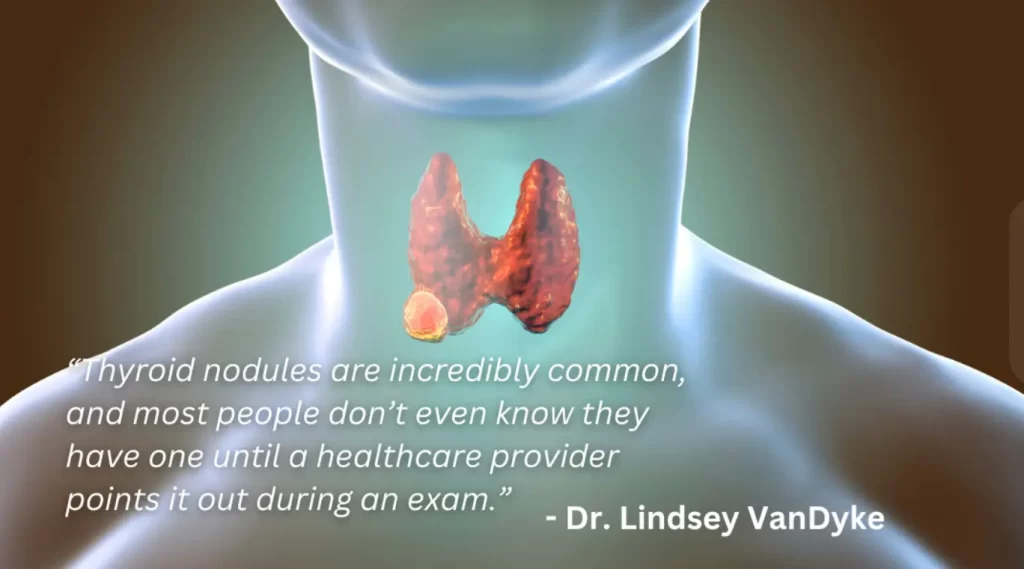Expert insights from Dr. VanDyke at the Advanced Institute for Diabetes & Endocrinology in Dallas
Thyroid nodules are a common medical concern. These small lumps or growths within the thyroid gland can vary in size and significance. While many thyroid nodules are benign and asymptomatic, some may cause discomfort or require medical attention. Dr. VanDyke, a leading expert at the Advanced Institute for Diabetes & Endocrinology in Dallas, shares valuable insights into the nature of thyroid nodules, their diagnosis, and the advanced treatment options available locally.
What are thyroid nodules?
The thyroid gland, a small, butterfly-shaped organ located at the front of the neck, is responsible for regulating the body’s metabolism by producing essential hormones. Occasionally, nodules—small growths—can form in the thyroid. According to Dr. VanDyke, “Thyroid nodules are incredibly common, and most people don’t even know they have one until a healthcare provider points it out during an exam.”
These nodules can be either solid or fluid-filled, and while most are benign, it’s important to monitor them regularly. Thyroid nodules are often detected during routine checkups or imaging tests conducted for other health reasons, such as a CT scan of the neck. Many people may remain unaware of their thyroid nodules until they undergo such procedures.
How are thyroid nodules diagnosed?
Once a thyroid nodule is detected, several steps are taken to assess whether it requires further action. Dr. VanDyke explains that a physical examination is typically followed by blood work to measure thyroid hormone levels, including TSH, T3, and T4. “Blood tests help us determine if the thyroid is functioning properly or if it’s overactive, which can indicate a problem like hyperthyroidism,” says Dr. VanDyke.
Patients will need a thyroid ultrasound, a non-invasive imaging test that provides detailed information about the size, shape, and composition of the nodule. “An ultrasound is the gold standard for diagnosing thyroid nodules,” notes Dr. VanDyke. “It helps us determine if a nodule is solid, fluid-filled, or a mix of both. Ultrasound also helps us identify any calcifications, which can increase the risk of cancer.”
Do all thyroid nodules require treatment?
Dr. VanDyke emphasizes that not all thyroid nodules require immediate treatment. “Most nodules are benign and don’t cause symptoms, so we often just monitor them over time. If they are small and asymptomatic, regular ultrasounds are usually sufficient.”
However, if the nodule shows signs of growth, or if the patient experiences symptoms like difficulty swallowing, hoarseness, or a noticeable lump in the neck, further evaluation is necessary. Fine needle aspiration (FNA) biopsy is often recommended in such cases. “A biopsy allows us to analyze the nodule cells and determine whether they are benign or malignant,” explains Dr. VanDyke. “While the majority of nodules are benign, some may require additional treatment, especially if cancer is suspected.”
Advanced treatment options in Dallas
For patients in Dallas dealing with problematic thyroid nodules, the Advanced Institute for Diabetes & Endocrinology offers cutting-edge treatment options, including radiofrequency ablation (RFA). RFA is a minimally invasive technique designed to shrink thyroid nodules without the need for surgery. Unlike traditional thyroidectomy, which involves removing part or all of the thyroid gland, RFA uses heat generated by radiofrequency waves to reduce the size of the nodule while preserving thyroid function.
“There’s no incision—nobody’s cutting anything. It’s basically a needle stick instead of a cut,” says Dr. VanDyke. “Radiofrequency ablation can shrink a nodule by up to 80% over a course of 3 to 6 months, and because you can do that, you get to preserve the rest of the thyroid function.” This procedure allows patients in Dallas to avoid more invasive surgery and maintain the vital functions of the thyroid, which acts as the body’s thermostat, regulating everything from energy levels to metabolism.
Why local expertise matters
In a bustling metro like Dallas, where health concerns are often compounded by busy lifestyles, having access to top-tier thyroid care is crucial. Dr. VanDyke and her team at the Advanced Institute for Diabetes & Endocrinology provide personalized treatment plans, leveraging the latest medical technologies to ensure patients receive the best care possible. Whether it’s managing benign thyroid nodules or addressing more complex thyroid conditions, Dr. VanDyke’s expertise offers Dallas residents peace of mind and advanced care options close to home.
Take control of your thyroid health in Dallas
If you’ve been diagnosed with a thyroid nodule or are experiencing symptoms related to your thyroid, consult with Dr. VanDyke at the Advanced Institute for Diabetes & Endocrinology in Dallas. Thyroid health plays a crucial role in your overall well-being, and early diagnosis and intervention can make all the difference.
📞 Schedule a consultation today and take the first step towards better thyroid health.
📍 Serving the Dallas Metroplex
Visit our clinic and discover how our advanced treatment options can help you manage thyroid nodules and maintain optimal thyroid function.

